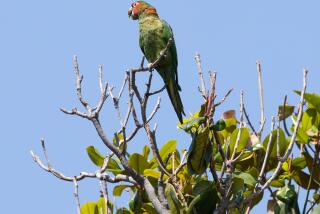Destructive Black Bird Is Nothing to Crow About
- Share via
AUBURN, N.Y. — Despite the crow’s reputation as a destructive pest, villain and harbinger of trouble, a hunting contest to thin the swarms of crows that winter in Auburn gives the city a black eye, according to critics who would rather celebrate the big, black bird.
“We don’t like the image it gives our city,” said Rita Sarnicola, head of the Crow Committee, a group that opposes the second annual crow hunt. “It’s not hunting. It’s killing for killing’s sake. And then they throw a party.”
The contest was held informally for several years until it became organized and publicized last year, when nearly 150 hunters bagged 348 birds in a weekend. During a two-day hunt in February, 208 hunters, including some from as far away as Kentucky and Arizona, killed 1,061 crows.
“We aren’t doing anything that’s illegal,” said Tom Lennox, one of the organizers whose tavern sponsors the contest.
“They like to portray us as bloodthirsty killers. These are people who go to the grocery store to buy slaughtered cows, pigs, chickens, turkeys,” said Lennox, adding that many hunters eat the crows.
“And they’re worried about Auburn’s image. We have a maximum-security prison here that has some of the state’s most notorious murderers and where they used the electric chair for the first time,” he said.
Residents of Auburn, 20 miles west of Syracuse, have spent years grousing about huge numbers of crows roosting all winter long. About 15 years ago, Auburn became home to as many as 50,000 crows each winter, outnumbering the human population of 28,574. Many residents complain that the crows, which flock into the city at dusk after daily feedings in the country, are a noisy nuisance that soil the city with their feces.
The roost has declined to about 25,000 recently. Cornell Ornithology Laboratory researchers say that’s probably because of West Nile virus, which is fatal to crows.
One recent protest by Sarnicola’s group ended with a march to City Hall, where the group urged local and state lawmakers to outlaw wildlife shooting contests without limits on the number of animals that can be killed.
“What we should do is embrace this in a positive way,” Sarnicola said.
Instead of a hunt, Sarnicola wants the city to put together a crow festival featuring music, entertainment and antiques while honoring someone who’s done “something to crow about.” Sarnicola also envisions the crowning of a crow princess.
Sarnicola argues that the hunt may just drive more crows into the city, where they are safe from hunters.
Crow season runs from Sept. 1 to March 31, but crows can only be hunted Friday through Monday, a legal quirk that dates to the federal 1918 International Migratory Bird Act. Hunting is prohibited within city limits.
Auburn Mayor Timothy Lattimore supports the crow hunt.
“If these were deer, there would be no objections to thinning the herd,” he said. “The population here is overwhelming. It is affecting business downtown and the quality of life here.”
Lattimore said the city also is considering other control measures, such as special firecrackers, sirens, spotlights, laser beams and predators, including hawks and falcons.
Crow Busters, a national crow hunters’ organization based in Lutherville, Md., says crows are regarded as highly intelligent creatures with the uncanny ability to detect trouble -- a characteristic that hunters say makes them a worthwhile adversary.
In the 1940s and ‘50s, crow hunting reached a zenith. The federal government put a bounty on the birds during World War II, designating the “black bandits” as a public enemy and traitor for robbing the nation’s farms of grain, according to the group’s website.
The group says the birds feed on cultivated crops in the South and Midwest, and eat the eggs and fledglings of waterfowl and upland game birds.
In the last 20 years, the crow population has exploded in suburban areas, especially in the East. One of the largest roosts in the country is in Springfield, Ohio, where as many as 100,000 crows have been wintering. In January, officials there dropped plans to feed the birds poisoned corn to reduce the population because they did not think that it would have a significant long-term effect.
More to Read
Sign up for Essential California
The most important California stories and recommendations in your inbox every morning.
You may occasionally receive promotional content from the Los Angeles Times.













